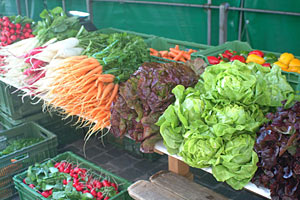Going Organinc
 By Linda Buzzell-Saltzman By Linda Buzzell-Saltzman
Santa Barbara Organic Garden Club
Earthlight, Reader Forum, Winter 2004-2005
Most discussions of the transition towards vegetarianism and veganism -- including yours in the Autumn 2004 issue -- omit a very important step in the process: going organic. All meat is assumed to be 'factory-farmed' and cruelly treated, so total abstention is presented as the only moral alternative.
While I agree wholeheartedly that anyone with a conscience should abstain from eating factory-farmed meat or dairy - which not only is unethical but also toxic to one's own body - there are a number of positive steps that readers who aren't yet ready to leave all animal products behind can take. For example, many farmers' markets offer local organic eggs from humanely-care-for chickens. There may still be objections to this practice, of course, but for the chickens it is a huge improvement from the usual poultry farm conditions.
Also, permaculture teachers recommend that natural 'backyard food forest' ecosystems contain not only plants but animals. They feel that a garden without animals is a rather lifeless affair. Fish can be raised in ponds; chickens and ducks eat bugs and provide both eggs and companionship for the gardener. Goats and small cows may join the family too. In return for all they contribute, these animals are protected and fed themselves in a symbiotic cycle. Milk and eggs may be the only animals products that the backyard farmer harvests, or the animals may be eaten too at the end of their productive lives. Like Nature herself, age-old farming wisdom dictates 'waste not, want not.'
Permaculture teachers also recommend leaving a part of one's land as habitat for wild animals. The challenge for the caring gardener, of course, is to balance the food needs of her family and the welfare of other plants and animals in the ecosystem.
We must also face our own genetic heritage in considering the transition to vegetarianism and veganism. Scientists inform us that we have been scavengers and intermittent meat-eaters for most of our short history on this planet, and our bodies are adapted to that diet. So it is fairly natural for us to crave meat, just as many of our animal brother and sisters crave meat. It is a sacred act to eat and in our turn be eaten. As humans we are capable of making a moral transition to vegetarianism and veganism if we are nutritionally careful, but we must have compassion both for our animal selves and our animal relatives as we do so.
A final thought: I recommend that anyone making this switch begin by taking up the practice of cultivating some of their own food, if only growing tomatoes on an apartment patio or herbs on a sunny window ledge. I have found that this process and the land itself will begin to shift your consciousness as you stop being a factory-supermarket 'consumer' and become part of the process of cultivating, growing, cooking and eating the Earth.
Return to Top |